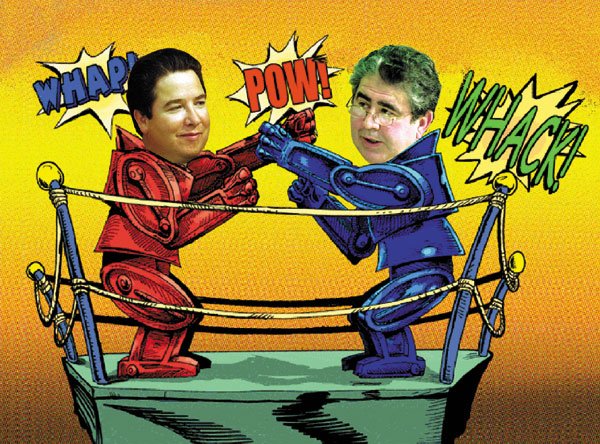Mayor, and potential challenger differ on many city issues
Gilroy – Delegates from all over the state met in San Diego last month for the annual League of California Cities conference, and one leader was promoting Gilroy by chatting up attendees and handing out garlic bulbs. That man wasn’t Mayor Al Pinheiro, the city’s foremost spokesman and ambassador. It was his colleague and frequent policy rival – Councilman Craig Gartman.
Whether handing out garlic bulbs, demanding greater control over the city budget, or sparring over the right of arbitrators to resolve labor disputes, the councilman has consistently set himself apart from the mayor. Gartman always seems to land on the “right” side of issues – at least in terms of electoral math – and his actions, it is widely whispered, belie a man prepping for a political campaign.
Still, Gartman refuses to say if he’ll challenge Pinheiro for re-election in fall 2007.
“Right now, am I planning on running for mayor? No. I have not told anybody I’m running for mayor and I’ve told Al that,” Gartman said. “Just because I differ in opinion on some subjects does not mean I want to take over the mayor’s job. But I would never be so bold as to say never.”
A three-year tenure in office has seen successes for Mayor Pinheiro, most notably the downtown revitalization, but also a growing list of political liabilities. Residents of Miller Avenue will not soon forget that he led the council in a split decision to replace two homes with half a dozen houses on the stately, tree-lined street. Firefighters and police officers, two of the best organized political forces in the community, beat back an effort led by Pinheiro last year to uproot binding arbitration, their strongest bargaining chip in labor talks. Gartman sided with Miller Avenue residents and scores of other people across the city with gripes about development. He also challenged Pinheiro on the arbitration issue on the way to a resounding first place finish in the Nov. 2005 council election, aided in part by endorsements from fire and police unions.
“I think that any time you make tough decisions, you become vulnerable because people will focus on those one or two issues,” said Pinheiro, who received the endorsement of the fire and police unions when he ran for mayor in 2001. “But you’re not mayor just for those two issues. It’s a 24-7 job.
“The first time we all met when I ran for mayor,” he added, “I said to supporters, ‘I appreciate you all being here,’ but I told them, ‘I’m not going to always vote the way you want me to.’ As long as they see me as someone that looks at issues and tries to balance things, I’m fine with that.”
Pinheiro, a local insurance salesman first elected to council in 1999, has made a point of building consensus on council. The effort has seen success in the last few years, with members finding solutions to some of Gilroy’s thorniest issues, ranging from the successful passage of a farmland preservation policy to development plans for the Hecker Pass corridor.
The climate on council is far less divisive under Pinheiro than it was under former Mayor Tom Springer in the late nineties, according to Councilman Peter Arellano.
“I believe the council as a whole is working much smoother than it did when I was first on there,” Arellano said. “I believe (those) years I was on the city council were not pleasant. … If that’s all due to the mayor, I don’t know. I can’t point to one person or a personality that’s doing it.”
Gartman is often a solitary dissenter. When council recently decided to swallow a $370,000 legal settlement to avoid a wrongful termination suit by a former building official, Gartman cast the lone vote against the decision. He refused to elaborate his reasoning for the decision.
When council took up the perennial issue of cracked and uprooted sidewalks, Gartman proposed immediately carving millions of dollars out of the city budget to address the issue. Council deferred the decision for nearly a year by calling on a task force to study solutions and potential costs. Gartman, who made sidewalk repair a top campaign priority last fall, seethed over the delays.
“When (Mayor Pinheiro) started off he was talking about making sure there was a consensus on council,” Gartman said. “In the beginning he spent a great deal of time asking what the council’s feelings were on issues. When he started off that was one of his greatest strengths. I think it’s an area that he needs to concentrate on to make sure that keeps happening on council.”
Republican political activist Mark Zappa said any challenger will have a tough time unseating Pinheiro in 2007 because the mayor has not “made any catastrophic mistakes in judgment.” At the same time, he faulted the mayor for giving too much deference to the recommendations of city staff – a criticism also leveled by Gartman.
While the councilman has publicly scolded staff members for over-stepping their authority in the realm of policy-making, Pinheiro has placed a premium on civility at public meetings and on numerous occasions has scolded residents who shout at staff and council members. He took issue with Gartman’s public criticism of staff and the suggestion that he rubber-stamps staff recommendations.
“I don’t believe that in order to get a job done, we need to chastise staff in front of the whole world,” Pinheiro said. “The one thing that bothers me is that some people think they can be a planner, an engineer, a negotiator. I’m an insurance professional. The reasons we have all these professionals is to give us the information to help us formulate our decisions.”
For his part, Pinheiro has taken strong positions against several staff recommendations, including a proposal to ban fireworks and prohibit alcohol consumption in public parks. Instead he has helped broker compromises on those policies.
The next council election is more than a year away and Pinheiro and Gartman are quick to point out that they and the other five council members continue to agree on the vast majority of issues.
Jane Howard, a prominent member of the local Republican party and the city’s tourism director, has worked with both Gartman and Pinheiro on a number of community projects. She described Gartman as having a “directive” approach to leadership while Pinheiro relied on “team-building.”
Leadership style and voting record aside, basic voter psychology will decide if Gartman or any other challenger stands a chance against Pinheiro in 2007, Howard predicted.
“I think voters have a short memory,” she said. “If you have an incumbent running for a position, I think you have to find a reason not to vote for him, especially when you have two good people running. I think that’s the scenario here.”














